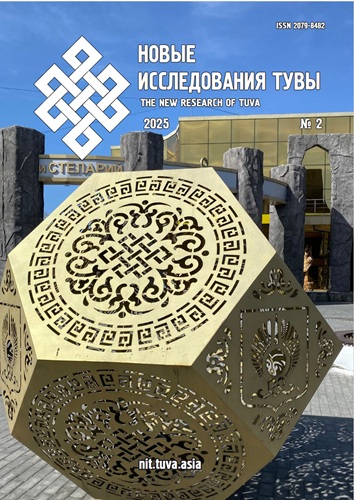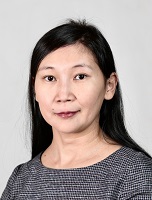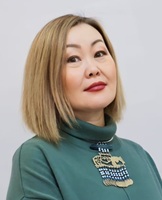Оценка языковой комфортности в городском пространстве северного и арктического города
DOI:
https://doi.org/10.25178/nit.2025.2.9Ключевые слова:
языковое пространство; город; модель языковой комфортности; языковая ситуация; языковая политика; языковой конфликт; северный город; Арктика; Якутия; ЧукоткаАннотация
В статье представлена разработка инструментария для оценки языковой комфортности в городском пространстве, который применен на примере северного и арктического города. Языковая комфортность понимается как комфорт и потребность в использовании в повседневном обиходе языков — компонентов социально-коммуникативной системы города, наличие условий для их гармоничного софункционирования и широкой функциональной дистрибуции. Источниками выступили материалы комплексного исследования языкового пространства в Республики Саха (Якутия) — гг. Якутск, Мирный и Чукотского автономного округа — гг. Анадырь, Билибино (2023–2024), с анкетированием 800 горожан и интервьюированием 41 чел.
Инструментарий позволяет детально рассмотреть соотнесенность социокультурных факторов, являющихся ключевыми в формировании облика города — близость городского сообщества от природы, исторический, политический, экономический факторы, демографическая, коммуникативная и символическая мощности и языковой конкуренции или языковой монополии, языковых идеологий, языкового активизма в условиях Севера и др.
Установлено, что уровень языковой комфортности в городском пространстве определяется взаимообусловленностью правовой и административной поддержки, активностью городского сообщества, языковых активистов, научно проработанного подхода к решению языковой проблемы и социального климата.
Библиографические ссылки
Аванесов, С. С., Федотова, Н. Г. (2022) Город в поисках идентичности. СПб. : Алетейя. 408 с.
Астахова, И. С. (2016) Религиозная идентичность населения Якутии: история и современность // Арктика. XXI век. Гуманитарные науки. № 2 (8). С. 26–31.
Биткеева, А. Н., Хохолова И. С., Филиппова В. В. (2023) Модель языковой комфортности в городском пространстве: Новые аспекты и методы исследования // Новые исследования Тувы. № 3. С. 151–170. DOI: https://doi.org/10.25178/nit.2023.3.10
Биткеева, А. Н. (2024) Социокультурные и языковые параметры урбасистемы северных арктических городов РФ // «Огни магистрали»: исторический опыт и стратегии развития регионов Сибири и Дальнего Востока (к 50-летию начала строительства Байкало-Амурской железнодорожной магистрали) : сборник научных трудов по материалам всероссийской научно-практической конференции с международным участием / под ред. Н. С. Байкалова. Улан-Удэ : Изд-во Бурятского госуниверситета имени Доржи Банзарова. 456 с. С. 232–240.
Биткеева, А. Н., Данилова, Р. А. (2023) Языковая биография арктического города (материалы полевого исследования в городе Анадырь) // Социолингвистика. № 4 (16). C. 92–106. DOI: https://doi.org/10.37892/2713-2951-4-16-92-106
Бокаев, Б. Н. (2011) Язык как фактор этнической идентичности // Актуальные проблемы гуманитарных и естественных наук. № 5. С. 95–100.
Буркова, Е. И. (2011) Религиозная идентичность как фактор политического развития России // Дискурс-Пи. № 1 (42). С. 91–113. DOI: https://doi.org/10.24412/1817-9568-2021-1-91-113
Вахтин, Н. Б. (2001) Языки народов Севера в 20 веке: очерки языкового сдвига. СПб. : Дмитрий Буланин. 338 с.
Вахтин, Н. Б., Лярская, Е. В. (2019) Человеческие и инфраструктурные связи Арктической зоны РФ: Методологические подходы к изучению // Проблемы Арктики и Антарктики. Т. 65. № 3. С. 341–352. DOI: https://doi.org/10.30758/0555-2648-2019-65-3-341-352
Винокурова, Д. М., Томаска, А. Г. (2021) Внутренняя и внешняя миграция в Республике Саха (Якутия): отношение студенческой молодежи // Власть и управление на Востоке России. № 1 (94). С. 177–187. DOI: https://doi.org/10.22394/1818-4049-2021-94-1-177-187
Головнев, А. В. (2022) Северность России. СПб. : МАЭ РАН. 450 с.
Егорова, А. И., Нафанаилова, М. С., Макарова, А. П., Сидорова, Т. Н. (2013) Особенности этнической идентичности чукчей, проживающих в Нижнеколымском районе Республики Саха (Якутия) // Вестник Северо-Восточного федерального университета им. М. К. Аммосова. Т. 10. № 2. С. 150–158.
Инглхард, Р. (2022) Неожиданный упадок религиозности в развитых странах. СПб. : Издательство Европейского университета в Санкт-Петербурге. 237 с.
Казакевич, О. А., Будянская, Е. М., Евстигнеева, А. П., Коряков, Ю. Б., Мордашова, Д. Д., Покровская, С. В., Поливанов, К. К., Ренковская, Е. А., Халилова, З. М., Шейфер, К. О. (2022) Шкалы языковой витальности и их применимость к материалу конкретных языковых ситуаций // Вопросы языкознания. № 4. С. 7–47.
Кибрик, А. А. (2020) Cохранение языкового разнообразия России: контуры программы // Социолингвистика. № 1. С. 17–28.
Коломиец, О. П. (2021) Современная этноязыковая ситуация на Чукотке // Вестник Омского университета. Серия «Исторические науки». Т. 8. № 4 (32). С. 119–131.
Мясников, А. А. (2014) Российская идентичность: концептуальные аспекты // Западно-Сибирский педагогический вестник. № 1. С. 16–25.
Пронина, Т. С. (2015) Религиозная идентичность как психосоциальный феномен // Вестник Русской христианской гуманитарной академии. Т. 16. Вып. 2. С. 154–166.
Российская Арктика: Коренные народы и промышленное освоение (2016) / под ред. В. А. Тишкова. М. ; СПб. : Нестор-История. 272 с.
Российская и Мировая Арктика: население, экономика, расселение (2022) / сост. В. В. Фаузер, А. В. Смирнов, Т. С. Лыткина, Г. Н. Фаузер; отв. ред. В. В. Фаузер. М. : Политическая энциклопедия. 215 с.
Хальбвакс, М. (2007) Социальные рамки памяти. Пер. с фр. и вступ. статья С. Н. Зенкина. М. : Новое издательство. 348 с.
Опубликован
Как цитировать
For citation:
Bitkeeva A. N., Khokholova I. S. and Filippova V. V. Assessment of linguistic comfort in the urban space of the northern and Arctic cities. New Research of Tuva, 2025, no. 2, pp. 169-187. (In Russ.). DOI: https://doi.org/10.25178/nit.2025.2.9
Выпуск
Раздел

Это произведение доступно по лицензии Creative Commons «Attribution-NonCommercial» («Атрибуция — Некоммерческое использование») 4.0 Всемирная.

Автор (лицензиар) произведения предоставляет простую (неисключительную) лицензию на использование редакцией (лицензиатом) произведения науки, который заключается в упрощённом порядке (открытая лицензия), согласно ст. 1286.1. «Открытая лицензия на использование произведения науки, литературы или искусства» Гражданского кодекса Российской Федерации.
В нашем издании публикуемые материалы доступны по лицензии Creative Commons «Attribution-NonCommercial» («Атрибуция — Некоммерческое использование») — CC BY-NC.
Т. к. лицензия открытая, автор имеет право разместить статью после ее выхода на своем сайте, читатель может скопировать и разместить на своих персональных ресурсах, в том числе в виде выдержек, конспектов, но:
а) обязательно должно быть указано ФИО автора, неизмененное название статьи и гиперссылка на первоисточник (журнал «Новые исследования Тувы»),
б) размещающий не имеет права брать деньги за доступ к этому материалу или каким бы то ни было образом давать преимущество одним читателям над другими,
в) при перепечатке автором текста статьи без значительных изменений (если сохраняется 30% текста или более) должно быть указано, что первая редакция статьи вышла в журнале «Новые исследования Тувы» и сделана соответствующая ссылка.
Лицензия действует по всему миру, длится в течение срока авторских прав на произведение, является неотзывной.











